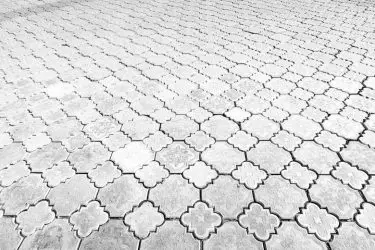Construction companies offering driveway building services, but many homeowners prefer to build their own. The first step for them is to determine the suitable material for their driveway.
Concrete is better than asphalt for your driveway because of its strength, environment-friendliness, better temperature control, and water-resistance. Asphalt, on the other hand, is a budget-friendly alternative with fewer perks and higher maintenance.
In this article, you’ll learn more about both options, including their advantages and disadvantages, insights into the type of building materials you should use, the best repair options, and the driveway construction that suits you. By the end of this piece, you will be able to make an informed decision as to which material you should use for your driveway.

Table of Contents
Asphalt: A Brief Overview
Bitumen is extracted from natural deposits and is also retained as a byproduct of petroleum distillation. On an elemental level, the mixture contains carbon, nitrogen, oxygen, hydrogen, and sulfur. There are traces of iron, vanadium, and nickel that vary depending on the yielding conditions.
This viscous liquid is then mixed with stones, pebbles, and sand to turn it into the semi-solid state that one can use to lay a driveway.
To an extent, bitumen plays the role of construction glue to stones and pebbles that make up a bulk of the structure’s integrity.
Needless to say that one cannot use this kind of material to erect tall buildings, something concrete is ideal for. But for flat structures like roads and pavements, asphalt is a primary choice.
Asphalt is skid-resistant, which makes it a road construction favorite. Since you’re used to driving on asphalt, it is only reasonable to assume that an asphalt driveway would feel natural.
It is also quite durable because of the stones that make up the bulk of its structure. The superheated liquid that binds them becomes a solid upon reaching average outdoor temperature making the entire asphalt structure a pressure-thickened solid.
While the material is undoubtedly durable, it isn’t entirely impermeable. Again, the microscopic passage between the bitumen and what it binds may allow air and the elements to pass through.
That is why the weather becomes a pivotal factor to keep in mind when choosing the asphalt driveway.
Asphalt’s workability depends on the levels of coarse aggregate used in the process. It is harder to treat fresh asphalt as liquid cement when it has too many pebbles and stones.
Asphalt doesn’t have a universal consistency, and there might be variations depending on the batch. But the general manufacturing process has enough in common for us to know the process’s advantages and drawbacks.
Pros of Asphalt Driveways
This section will explore the benefits of using asphalt for your driveway from the construction stage to post-establishment. Here are the advantages of asphalt for your project.
Cheaper To Install
As mentioned earlier, asphalt manufacturing processes can vary, and as the ingredient variety differs, the cost does too. Some batches may have more stones; others may have more sand.
But regardless of the quantities of specific ingredients in a batch of asphalt, it costs less than concrete per square foot.
We can confidently say that an expensive batch of asphalt is cheaper than a “cheap” batch of concrete mix. However, the level of difference varies.
On average, you will spend 25% to 50% less using asphalt for your driveway than concrete.
The material is naturally cheaper as it is made from an otherwise useless byproduct with only construction and roofing use.
On the other hand, concrete has a wide enough range of benefits even within the construction industry that its demand alone makes it twice as expensive as asphalt in some instances.
Quicker To Complete
If you’ve painted your house before, or even been in a house while it was being painted by someone else, you remember the “wet” phase. It takes time before certain materials are dry to the touch. When it comes to laying your driveway, you can expect that with building materials like concrete.
Asphalt, on the other hand, cures rapidly. It chemically cures 200 times faster than concrete.
You can lay our driveway with asphalt today and drive over it tomorrow.
That said, it’s worth noting that this is only the case with standard asphalt with enough solid aggregate. Some varieties may be explicitly manufactured to increase workable-longevity.
In such batches, there will be smaller pebbles, more sand, and fewer stones. This variety of asphalt may take longer to cure sufficiently. Still, the overall lay-to-use time of asphalt will always be shorter than that of concrete.
Easier To Repair
Finally, no discussion about a construction project is complete without addressing repairs. Asphalt is relatively easy to repair.
Cracks will be the most prominent damage your driveway will suffer. Fortunately, they’re easy to fill and seal if you’ve used asphalt. Given the low cost of asphalt, the repairs are also relatively cheap.
Since asphalt constituencies vary, you can pour filler into the cracks. While the filler may not have the same texture as the original batch, asphalt driveways don’t have a smooth appearance anyway, so the repair work is not apparent.
Can Withstand Extreme Weather
If you live in a region with sweltering summers and snowy winters, your asphalt driveway will shrink and expand according to the temperature.
While this may not be visible to the naked eye, the driveway’s structural integrity is maintained.
The heat might liquify bitumen that holds the stones together, but it won’t be enough to turn the driveway into sludge. At the same time, most of the aggregate is made up of solids that stay solid independently and help keep the driveway stable.
In contrast, concrete can crack from high pressure.
Cons of Asphalt Driveways
There are several reasons why asphalt isn’t the primary choice for driveway construction. This section will explore these disadvantages, which mainly have to do with the driveway’s maintenance.
Relatively Shorter Lifespan
As with any construction project, it is essential to consider the material’s longevity.
An asphalt driveway lasts a maximum of two decades.
When you opt for asphalt, you’re committing to twenty years of maintenance and upkeep (explored further elsewhere in this section).
Since this disadvantage has to do with the material itself, there is no way to counter it. Therefore, you should only lay an asphalt driveway if you’re willing to renew the project in twenty years.
Quick-Curing Impacts Workability
While we have mentioned quick curing as an advantage, the property has its disadvantage as well. As concrete takes longer to solidify, you can smooth it and correct any mistakes with relative ease while it is drying.
But asphalt hardens quickly, making any bumps you notice later almost impossible to remove. How to counter this drawback: Use asphalt with a more workable consistency and fewer large solids.
This will allow you to lay the material with relative ease.
Requires Professional Installation
When laying an asphalt driveway, you’ll need a heavy roller to make sure there aren’t any bumps. Since most of the material is made up of stones, there are bound to be bumps that need to be evenly pressured into position as the bitumen solidifies around them.
For this, you may rent a roller truck, provided it doesn’t require a special license in your state. The money you save on not hiring professionals gets spent renting the equipment.
Therefore, the practical way to an asphalt driveway construction is through driveway building companies.
How to counter this drawback: While you cannot opt-out of professional help without consequences, you can get your own asphalt to reduce the project cost. Professionals may mark up their preferred supplier’s product or try to persuade you to buy a different “brand.” As asphalt is a commodity and not a luxury product, the brand doesn’t matter anyway.
Requires More Upkeep
As mentioned earlier, an asphalt driveway is a twenty-year commitment. During this time, you’ll need to reseal the surface at least four times.
Asphalt needs to be resealed every four years to make sure the structure’s integrity isn’t compromised because of fluids leaking into cracks.
There is no way to counter this drawback, and it must be considered a minimum work investment you’re willing to make.
On the plus side, the repairs aren’t as expensive. If the cracks are visible at any point, regardless of the time since the last repair, you should immediately fill and seal the area.
This is truer for the center of the driveway than the sides. Border regions of your driveway to each side can survive longer unsealed compared to the main area you drive over.
Vulnerable to Gasoline
The reason you should seal the center region more rapidly is that any gasoline spills will cause damage. That is because gasoline doesn’t sit well with bitumen that binds the solids together.
If gas leaks into the asphalt and the weather turns hot enough for some bitumen to turn liquid, it won’t solidify to the same adhesive capacity once the weather gets cold.
Oil spills may leave only a stain, but excessive oil leakage isn’t suitable for exposed asphalt. This disadvantage isn’t entirely absent in the alternative either.
Both driveways need to be sealed, but the asphalt driveway needs to be sealed as quickly as possible.
How to fight this drawback: Make sure your car doesn’t spill fluids and keep FastPatch Asphalt Alligatoring Crack Repair in your garage. Any time you notice a crack, fill it and seal the surface. Here is a video of the crack repairing solution in action:
Concrete: A Brief Overview
Concrete is used in construction because of its durability and strength. The material is a composite of fine solids bonded by a cement paste. The bonding agents have varied across time, including lime putty and aluminum cement. The kind of cement used to bind the aggregate impacts the properties of concrete.
Generally speaking, concrete comes out grey but is conducive to paint. That’s why it is used in a variety of things, from kitchen countertops to skyscraper walls. While it is an uncompromising solid as a finished product, concrete is applied as a sludge.
Generally, concrete aggregate is mixed with cement powder and water to create this sludge. The amount of cement and aggregate used affects the final concrete. For novices, Quikrete can be a good solution.
Read more: What Concrete Mix to Use for a Driveway
This concrete mix comes with pre-added cement powder. Manufacturers ensure that the cement powder doesn’t react with the concrete solids.
When the mixture is added to water, cement reacts to become a liquid binder first and hardens to hold together the finer solids.
Pros of Concrete Driveways
It is clear that concrete is a durable and apt construction material for buildings and bridges. But how good is it for your driveway? Let’s explore some of its advantages.
Longevity
Concrete driveways last 33% longer than equivalent asphalt ones.
That means for an asphalt driveway that pushes two decades, a concrete driveway will last 30 years.
This negates most cost benefits for asphalt because, in the long run, concrete will end up costing you significantly less.
Let’s suppose you’re paying $3 per foot for a concrete driveway. An asphalt driveway would’ve cost $2 per foot. While concrete driveway will last you thirty years, asphalt would need to be renewed in twenty.
On the surface, it seems like there is no long-term difference in cost. However, one must keep in mind the cost of labor, resealing, and frequent repairs. In the final analysis, concrete comes out as an asset in this respect.
Fewer Repairs and Maintenance
Concrete driveways are less likely to require repairs. This is a result of the material’s durability. A urethane sealer can last ten years on a concrete driveway.
For an asphalt driveway, you’d need to reseal four times in two years, while a concrete one will require three coats across three years.
This saves not just money but also your time. With that said, you should also remember that using poor sealers will not give you lasting coverage just because the material underneath is durable.
Recommended article: 11 Best Concrete Sealers (and a few mistakes to avoid)
Acrylic-resin sealers wear off in three years. Since driveways don’t get constant traffic exposure, this type of sealer can push to five years, where the resealing frequency comes out equal to that of asphalt.
However, the main difference in upkeep frequency doesn’t come from the minimum resealing requirements; it comes from spontaneous cracks in asphalt.
Since asphalt uses thicker solids and bitumen binder, it contracts and expands depending on the weather. That gives the driveway more breathing room but keeps ripping the sealing coat, exposing the binder to the elements.
This is entirely absent from concrete, which can absorb heat and slowly release it when the weather changes.
Even though it might not happen as often as with asphalt, concrete is known for cracking in certain situations.
Therefore it might be good to be aware of the cost of repairing cracks in a concrete driveway, which we have written an article about.
Can Withstand the Elements and Fluid Exposure
While different people look for different qualities in their home improvement and construction projects, chances are none of them want to babysit their driveway.
You want to lay the driveway and not worry about it every time it rains.
A concrete driveway can give you that peace of mind. That’s because cement is not likely to liquefy due to the weather and mix with other fluids. Concrete, for the most part, is solid.
That’s why people build roofs and walls with this material. That’s something no one would do with asphalt as it becomes a soggy impact-receptive semi-solid pudding in an extremely hot climate.
Asphalt cracks, once exposed to leaking gasoline, become a problem. Concrete doesn’t crack as easily. The structural integrity of concrete remains intact against rain, hot weather, and blizzards.
Can Be Painted Over
This is an aesthetic advantage. Not everyone may value the look of their driveway enough to decide based on aesthetics alone; the benefit is still significant enough for a mention.
Regardless of the style of your house or the color of your garage, your driveway will not stick out when you can paint it as you please.
The reason buildings don’t all look grey is that they get painted over. Asphalt is conducive to paint but has such a dark natural color that only bold black and white colors show correctly. That’s why you’ll notice asphalt roads have white lines painted over.
Cons of Concrete Driveway
Even though concrete is the material of choice for most people laying their driveways, it has drawbacks too. And if you’re going to use concrete, you should be prepared for the following disadvantages.
Takes a Long Time To Cure
One of the most significant disadvantages of laying a concrete driveway comes in its construction stage. While the cement solidifies to a point where it doesn’t loosen up due to the weather, it takes a long time to do so.
Concrete can be dry to touch in a few hours but can take up to a week before it is dry enough to function as your driveway.
In other words, you might not only protect the driveway from pets and people accidentally leaving paw marks and shoe marks, respectively, but you will also need to keep your car off for an entire week before you’re ready to use.
How to fight this drawback: you can use quicker drying varieties of cement to speed up the curing time. However, it is worth the wait if you don’t want to overspend on the construction materials.
Simply get an average concrete mix and wait it out after laying the driveway.
Repairs Are Evident and Expensive
Though you enjoy the advantage of fewer repairs, if your concrete driveway does get damaged, you’ll need to spend more fixing it.
Depending on the type of damage, you might spend twice as much as you would fixing an asphalt driveway.
Here are the kinds of problems you might face:
- Potholes. If you drop a heavy object from your car’s trunk, you might have a dent that would need to be filled. To fix deep holes, you will need a concrete mix. Filling the gap and using the appropriate tool to smooth, you will then leave the area untouched for a long enough time to let the material cure.
- Cracks and breaks. If the concrete driveway comes under immense pressure, you might see cracks on its surface. To fix this, you should use a concrete patch like DAP Ready Mixed Concrete Patch.
- Paint and sealant problems. From time to time, the elements might chip away at the paint; for this, you will only need to reapply the paint. But if the sealant is defiled, you will require immediate resealing.
How to fight this drawback: The best way to counter the obviousness of patches and repairs on your driveway is to paint your driveway. As long as you keep similar paint at hand, You can also paint any patches over to get a uniform look.
Higher Upfront Cost
If you’re on a tight budget, you may want to turn away from concrete provided that you’re willing to spend more across the next twenty years.
While concrete is low-maintenance, it does cost more per foot. If your driveway covers a large enough area, the cost difference widens with scale, and you may end up paying twice as much upfront.
Read more: The Real Cost of Installing a Driveway
How to fight this drawback: You can reduce your driveway construction costs by getting concrete mix directly from suppliers. Many online avenues allow you to buy the materials directly from the manufacturer.
You can also reduce costs further by laying the driveway yourself. For that, you must be careful not to be too hasty.
Read more: Driveway Installation: Is it DIY-able? Will you regret it?
Videos like this can teach you how to finish your driveway as a DIY project:
Cannot Be Resurfaced If It’s too damaged
While concrete will last you a long time, you cannot give it a cosmetic upgrade when it eventually expires and are too damaged. Both gravel and asphalt, the main driveway alternatives to concrete, can be resurfaced with a fresh coat.
Too damaged concrete needs to be removed before you can apply a new layer. This again has to do with the structural and content differences.
Asphalt has large enough pebbles that a new layer of bitumen can bind with.
If you pour new concrete over old concrete it isn’t going to be more stable. If the concrete only has superficial cracks though, you can resurface the driveway without a problem.
Read more: How To Resurface a Concrete Driveway (Easy DIY Guide)
Needless to say, this isn’t safe if the old concrete isn’t good enough. In that case, you must root out the previously applied concrete every thirty years to reconstruct your driveway.
Which One Should You Use?
By now, it is clear that aside from some exceptions, concrete is the superior building material for your driveways. It will allow you to construct a driveway that lasts longer, requires fewer repairs, and can withstand traffic and the elements.
However, if you don’t have enough money right now but expect to have a better financial condition in the future, you can move forward with an asphalt driveway.
In the long run, it will cost about the same as having a concrete driveway, but at least you won’t have to pay it all upfront.
Also read: Concrete vs Tarmac vs Asphalt: What’s the difference?
If you’re still unclear on which one fits your needs, we have constructed two user profiles covering people who should get an asphalt driveway and those who should have a concrete one. Read below to see which one you belong to.
Choose Asphalt Driveway If:
- You have a light vehicle. Even though asphalt can withstand loaded trucks, its load-bearing ability reduces in hot temperature as bitumen liquifies. Therefore, you should use asphalt if your vehicle can drive over it on such days.
- You are on a tight budget. If paying 25% more will impact your financial freedom, and you can’t wait a few months to save up enough for the project, you should opt for asphalt as it costs less.
- You’re busy and have kids/pets. If you cannot keep people off your freshly constructed driveway because of your work, you should use a material that cures quickly. The last thing you want is to pay a premium for concrete only to return to a deformed driveway. Asphalt becomes rigid enough to withstand footsteps in a few hours.
- You live in an area with a variety of weather. If the weather changes rapidly, you might want to use a breathable material. Using asphalt would be good under such conditions, but you must be prepared for repeated resealing.
Choose Concrete Driveway If:
- You live in an urban setting. If you have a villa or McMansion with adjacent units, you may not like the cheaper blue-collar look of asphalt. A nice concrete driveway painted over to match your home’s exterior aesthetics would go a long way in making a great impression.
- You don’t have time to take care of the project. If you have enough money and time to build a concrete driveway and give it an uninterrupted week to cure but not enough to repeatedly fill cracks, you are better off with a concrete driveway.
- Thirty years are ‘long enough’ for you. If you consider thirty years as ‘forever,’ your driveway investment might as well be permanent. Using concrete will give you peace of mind.
Final Thoughts
Asphalt and concrete are both durable enough to handle driveway traffic but have different properties that make them suitable for different people.
Those willing to put up with twice the upfront cost but little to no maintenance are better off with concrete, while people who are handier and want to spend less initially should invest in an asphalt one.



